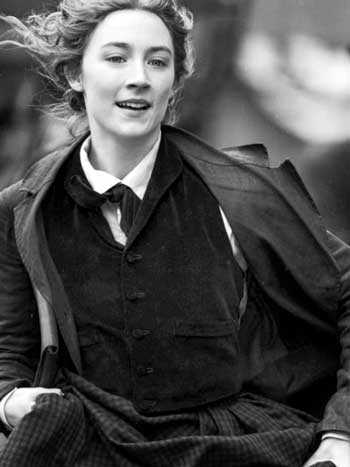Saturday Feb 21, 2026
Saturday Feb 21, 2026
Saturday, 28 December 2019 00:04 - - {{hitsCtrl.values.hits}}
 Esquire.com: Greta Gerwig’s star-studded adaptation of literary classic Little Women dazzles on the silver screen this Christmas. The film features a delightfully fussy Meryl Streep as Aunt March and not one, but two marriage proposal scenes from resident coming-of-age film heartthrob Timothée Chalamet as Laurie.
Esquire.com: Greta Gerwig’s star-studded adaptation of literary classic Little Women dazzles on the silver screen this Christmas. The film features a delightfully fussy Meryl Streep as Aunt March and not one, but two marriage proposal scenes from resident coming-of-age film heartthrob Timothée Chalamet as Laurie.
Gerwig’s adaptation is both hilarious and heart wrenching from open to close. The canonical work has been adapted dozens of times for the stage, screen, TV, and even as an opera, and Gerwig’s version is the sixth feature film of the same name.
Gerwig makes ‘Little Women’ a story within a story, highlighting the semi-autobiographical nature of the original work. We watch fiery sister Jo March novelise her family’s life as it happens, ultimately publishing Little Women at the end of the film. The role of headstrong Jo, played by Saoirse Ronan in Gerwig’s version, has been performed in other adaptations by icons such as Katharine Hepburn and Winona Ryder.
Of course, the original Jo was none other than ‘Little Women’ author Louisa May Alcott herself, who wrote the 1868 book about her family’s real poverty-stricken life in Concord, Massachusetts. Louisa May Alcott was educated by the likes of Henry David Thoreau, Ralph Waldo Emerson, and Nathaniel Hawthorne, who were all friends of her family, and so her predisposition and drive to write shouldn’t come as a surprise.
Gerwig takes care to imbue the character of Jo with details from Louisa May Alcott’s real life. As we see Jo do in the beginning of the film, Alcott began publishing thrillers under pen name A. M. Barnard in the early 1860s and wrote for the Atlantic Monthly.
In 1868, Alcott’s publisher asked that she write a book for girls. She was unenthusiastic about the project, but needed money, and so begrudgingly obliged. “I don’t enjoy this sort of thing,” she wrote in her journal. “Never liked girls or knew many, except my sisters, but our queer plays and experiences may prove interesting, though I doubt it.”
Alcott loosely based Little Women off of the lives of her and her real sisters Anna (represented in the book by Meg March), Elizabeth (Beth), and Abigail, who went by May (Amy). The book was an instant hit—its first print of 2,000 copies sold out in two weeks, and soon readers begged for a second volume. Those two volumes became the 759-page classic that readers still devour today.
According to a letter Alcott wrote to a friend, Jo’s marriage at the close of the Little Women book was only fan service. “Jo should have remained a literary spinster but so many enthusiastic young ladies wrote to me clamorously demanding that she should marry Laurie, or somebody, that I didn’t dare refuse and out of perversity went and made a funny match for her.”
Unlike her protagonist Jo, Louisa May Alcott herself remained unmarried for the rest of her life. In an 1883 interview, she said, “I am more than half-persuaded that I am a man’s soul, put by some freak of nature into a woman’s body...because I have fallen in love in my life with so many pretty girls and never once the least bit with a man.”
Louisa May Alcott, a staunch feminist and abolitionist all her life, fell ill in her later years and died of a stroke in 1888, at age 55. Though she may be disappointed Gerwig chose to faithfully adapt Jo’s marriage from her novel, she might be proud to see Jo fighting to own her book’s copyright, as Alcott did herself.